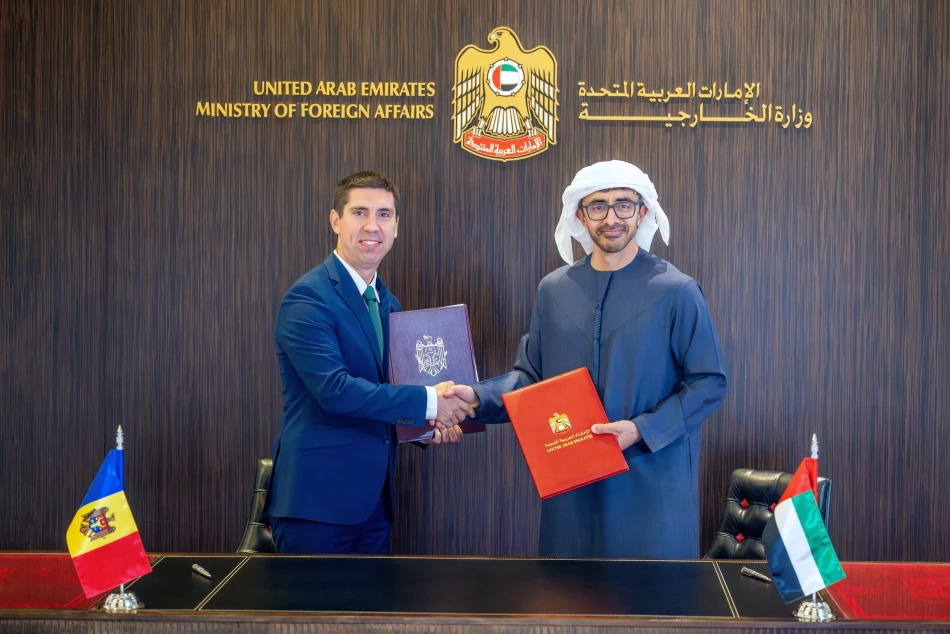
UAE and Moldova Sign Visa Waiver Agreement, Boosting Bilateral Ties
UAE and Moldova Forge Strategic Partnership with Visa-Free Travel Agreement
The United Arab Emirates and Moldova have signed a mutual visa exemption agreement, marking a significant step in strengthening diplomatic and economic ties between the Gulf powerhouse and the Eastern European nation. The deal positions both countries to capitalize on enhanced trade opportunities and reflects the UAE's continued strategy of expanding its global partnerships beyond traditional regional allies.
High-Level Diplomatic Engagement Signals Broader Ambitions
Sheikh Abdullah bin Zayed Al Nahyan, UAE's Deputy Prime Minister and Foreign Minister, met with his Moldovan counterpart Mihai Popsoi in Abu Dhabi to formalize the visa waiver arrangement. The agreement eliminates entry visa requirements for citizens of both nations, potentially boosting business travel, tourism, and investment flows.
During the meeting, both officials explored mechanisms to enhance bilateral relations across multiple sectors, including economic cooperation, trade partnerships, and investment opportunities that align with both countries' development strategies.
Strategic Context: UAE's Expanding Global Footprint
This agreement fits within the UAE's broader diplomatic strategy of diversifying its international partnerships. Similar to its approach with other emerging markets, the Emirates is leveraging visa liberalization as a tool to unlock economic opportunities in previously underexplored regions.
Moldova, despite its small size with a population of approximately 2.6 million, represents an interesting strategic choice. The country serves as a gateway to Eastern Europe and has been actively pursuing economic diversification following years of political instability and dependence on remittances.
Investment and Trade Implications
For UAE investors, Moldova offers potential opportunities in agriculture, renewable energy, and manufacturing sectors. The country's association agreement with the European Union provides indirect access to EU markets, making it an attractive investment destination for Emirati businesses seeking European market entry points.
From Moldova's perspective, the UAE represents access to Gulf capital and expertise in sectors like logistics, financial services, and technology. The Emirates' position as a regional hub could facilitate Moldovan exports to Middle Eastern and Asian markets.
Regional Comparison and Market Dynamics
This move mirrors similar agreements the UAE has established with other emerging economies, including several African and Latin American nations. The strategy reflects Dubai and Abu Dhabi's competition with Singapore and Hong Kong as global business hubs, where visa accessibility plays a crucial role in attracting international talent and investment.
Unlike larger European economies that often impose strict visa requirements, Moldova's willingness to establish mutual exemptions demonstrates its pragmatic approach to economic diplomacy. This contrasts with the more cautious stance taken by established EU members toward Gulf partnerships.
Economic Development Alignment
Both nations emphasized their commitment to sustainable economic development and comprehensive growth strategies. For the UAE, this aligns with its Vision 2071 goals of becoming the world's best country by the centennial of its founding. Moldova's participation supports its own development agenda focused on European integration while maintaining diverse international partnerships.
The timing of this agreement is particularly significant as both countries navigate post-pandemic economic recovery and seek new avenues for growth beyond traditional partnerships. The visa exemption could serve as a catalyst for deeper cooperation in emerging sectors like renewable energy, where both nations have expressed strategic interests.
Most Viewed News

 Sara Khaled
Sara Khaled






